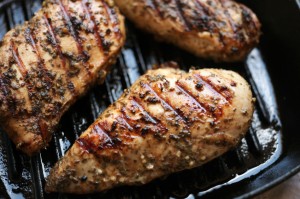 According to new research published in the Journal of the American Medical Association, people who eat more calories than they burn will lose lean muscle and accumulate body fat more easily if their diets consist of too little protein, and too much fat and carbohydrates. The study included 25 healthy young adults, ages 18 to 35. To begin the study, the participants lived in a carefully controlled research facility and were put on weight-stabilizing diets. After the initial period of a few weeks, their diets were increased by 1000 excess calories daily and they were assigned to diets of different protein levels. The researchers used sophisticated measurement techniques to evaluate how the level of protein in the diets affected weight gain, body composition, and energy expenditure.
According to new research published in the Journal of the American Medical Association, people who eat more calories than they burn will lose lean muscle and accumulate body fat more easily if their diets consist of too little protein, and too much fat and carbohydrates. The study included 25 healthy young adults, ages 18 to 35. To begin the study, the participants lived in a carefully controlled research facility and were put on weight-stabilizing diets. After the initial period of a few weeks, their diets were increased by 1000 excess calories daily and they were assigned to diets of different protein levels. The researchers used sophisticated measurement techniques to evaluate how the level of protein in the diets affected weight gain, body composition, and energy expenditure.
All the groups gained weight when eating the 1000 extra calories per day. The findings demonstrated that participants on a low-protein diet (5 percent of calories from protein) gained about half as much weight during the study as those on a standard (15 percent of calories from protein) or high-protein diet (25 percent of calories from protein). However, body fat accounted for a much higher percentage of weight gain for the low-protein group, rather than lean body mass, which includes muscle.
Specifically, about 90% of the extra daily calories were stored as body fat for the low-protein group, while in the other groups just 50% of the added calories were stored as fat and most of the remainder were burned off. According to some nutrition experts, even more important than body mass index or weight is the make-up of the weight–whether it is lean muscle or fat. The study authors suggest that this research shows that the current recommended daily minimums of protein for men and women may not be adequate to maintain lean muscle mass for some people. They recommend that people focus on eating a high-protein, low-fat diet that is rich in colorful vegetables and fruit. Some examples of lean protein include white-meat chicken, ocean fish, turkey, egg whites, and nonfat cottage cheese.
Dr. Terry Simpson of Southwest Weight Loss told us, “Nutritional research continues as we try to find the perfect combination of foods for a healthier lifestyle. Excess food, in any category – carbohydrates, protein, fat, or alcohol – is never healthy. Too many people tend to over eat the processed carbohydrates which leads to fat storage.” An earlier study found that eating a protein rich breakfast might be a good strategy to control appetite and prevent overeating throughout the day. You can read about the study here.






Nutrition & Lifestyle